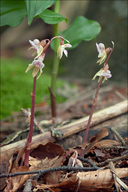|
|
click photo for larger file

Epipogium aphyllum
Ghost Orchid
|
Photographer: Dr. Amadej Trnkoczy
ID: 0000 0000 0816 0348 (2016-08-05)Copyright © 2016 Dr. Amadej Trnkoczy
|
|
INFORMATION PROVIDED WITH THE PHOTO
|
date of photo Aug 1, 2016
latitude 46.41000 longitude 13.75000
View on Google Maps.
location
Trenta valley, near Vršič pass road, southwest slopes of Mt. Prisank, 2.547 m (8.357 feet), East Julian Alps (Posočje, Slovenia)notes Slo.: brezlistni nadbradec - syn.: Satyrium epipogium L. - Habitat: steep mountain slope, southwest aspect, mixed Fagus sylvatica and Picea abies wood, under beeches; associated with Yellow bird's-nest (Hypopitys monotropa), Yellow coralroot (Corallorhiza trifida), Red Helleborine (Cephalanthera rubra) and Broad-leaved helleborine (Epipactis helleborine aggr), in shade, calcareous ground, on places with little or no ground vegetation, partly protected from direct rain by tree canopies, average precipitations ~3.000 mm/year, average temperature 2-4 deg C, elevation approximately 1.200 m (4.000 feet), alpine phytogeographical region. - Substratum: loose hummus soil. - Comment: It is always a happy event to see this legendary rare, mysterious and highly endangered wild orchid. This is particularly so, because even if one knows exactly where and when to search for it, it doesn't appear every year. Sometimes, searching can be of no avail for several consecutive years. I've been following its occurrence at these two sites for eight years now. The best blooming occurred in 2008 and much weaker in 2011. Next years there was nothing to see. In 2015 I found 16 plants in bloom and in this year there were about the same number at the first spot and only a single plant on the second spot. However, several have just protruded the ground surface and it seems possible that some more will appear in the next days. This achlorophyllous (having no chlorophyll), mycoheterotrophic (getting at least some part of its food from parasitism upon fungi) (not saprophytes! as frequently stated, see: Ref.:8), Euro-Asiatic plant, mostly living underground, has disappeared already from many places in Europe. O. Sebald et al. (1998) reports about a place in Baden-Württemberg, DE, which has been occasionally monitoring now for almost 80 years. Sources from 1935 talk about 'thousands of blooming plants'. The place was extensively studied again in 1996. Population found counted only 18 blooming plants. Drawings of the plants from 1935 show large groups of plants with up to 15 flowers per stem. In 1996 ten of 18 plants found had only a single flower and the highest number of flowers found was three - on a single plant. The main reason for this drastic decline seems to be nitrogenized soil through polluted air. Obviously no local protection means can help against polluted air. Protected by Uredba o zavarovanih prosto živečih rastlinskih vrstah, poglavje A, Uradni list RS, št. 46/2004 (Regulation of protected wild plants, chapter A, Official Gazette of Republic Slovenia, no. 46/2004), (2004). Pravilnik o uvrstitvi ogroženih rastlinskih in živalskih vrst v rdeči seznam, Uradni list RS, št. 82/2002 (Regulation of enlisting of endangered plant and animal species onto Red List, Official Gazette of Republic Slovenia, no. 82/2002) (2002) marked by 'E' representing a critically endangered species. Ref.: (1) M.A. Fischer, W. Adler, K. Oswald, Exkursionsflora für Österreich, Liechtenstein und Südtirol, LO Landesmuseen, Linz, Austria (2005), p 1049. (2) B.Dolinar, Kukavičevke v Sloveniji (Orchidaceae of Slovenia) (in Slovenian), Pipinova Knjiga, (2015), p 85. (3) A.Martinči et all., Mala Flora Slovenije, Tehnična Založba Slovenije (2007) (in Slovene), p 668. (4) O. Sebald, S. Seybold, G. Philippi, A. Wöerz, Die Farn- und Blütenpflanzen Baden-Württembergs, Ulmer, Band 8. (1998), p 318. (5) H. Baumann, S. Kuenkele, R.Lorenz, Orchideen Europas, Ulmer (2006), p 100. (6) H. Kretzschmar, Die Orchideen Deutschlands und angrenzenden Lander, Quelle Meyer (2008), p 144. (7) http://www.ncbi.nlm.nih.gov/pmc/articles/PMC2720653/ (8) http://www.kaowarsom.be/documents/B_59_2013/MERCKX.pdfcamera Nikon D700/Nikkor Micro 105mm/f2.8
contributor's ID # Bot_994/2016_DSC4325 photo category: Plant - annual/perennial
|
MORE INFORMATION ABOUT THIS PLANT
|
| common names
Ghost Orchid (photographer)
View all photos in CalPhotos of Epipogium aphyllum Check Google Images for Epipogium aphyllum |
|
The photographer's identification Epipogium aphyllum has not been reviewed. Sign in to review or comment on this photo |
|
Using this photo The thumbnail photo (128x192 pixels) on this page may be freely used for personal or academic purposes without prior permission under the Fair Use provisions of US copyright law as long as the photo is clearly credited with © 2016 Dr. Amadej Trnkoczy.
For other uses, or if you have questions, contact Dr. Amadej Trnkoczy amadej.trnkoczy[AT]siol.net. (Replace the [AT] with the @ symbol before sending an email.) |
|
|
